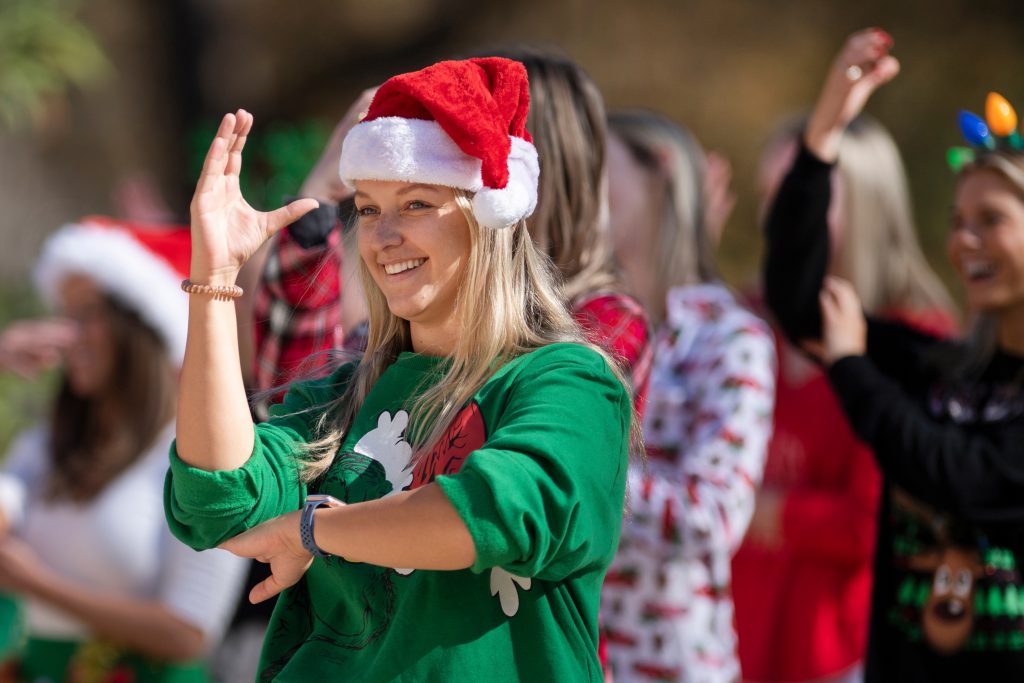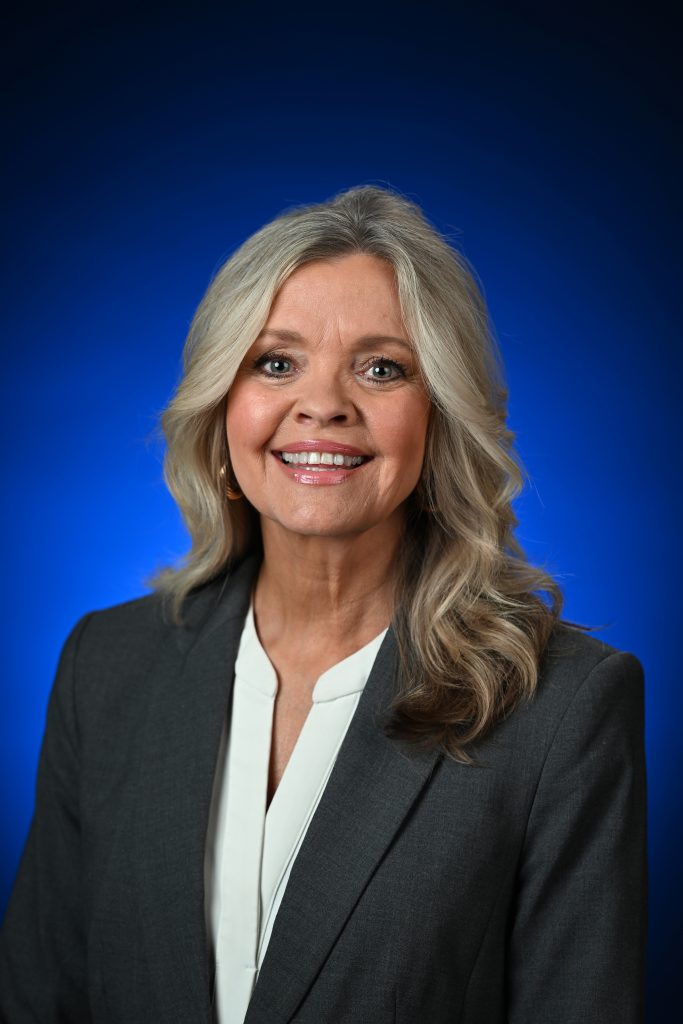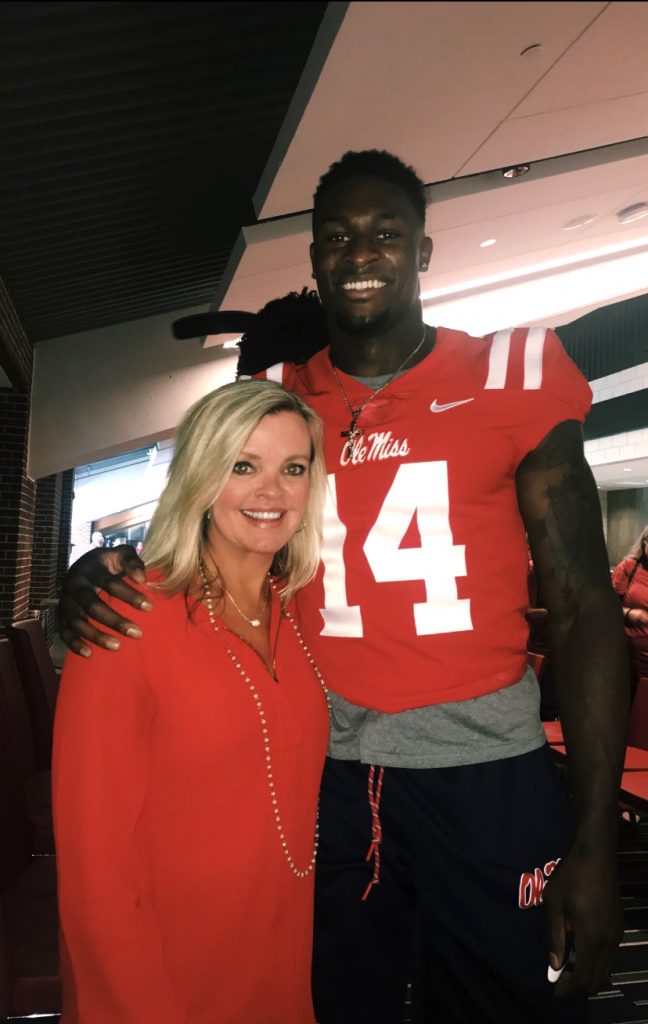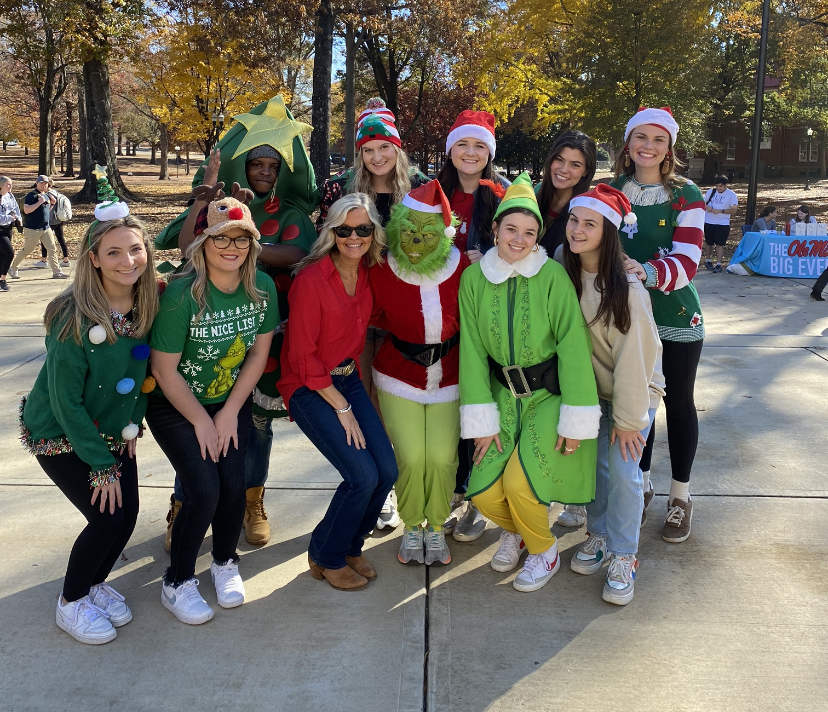
University of Mississippi students perform Christmas carols using American Sign Language as part of Handband's Holiday Signing Rave at the Ole Miss Student Union Plaza. Handband, a student organization advised by instructor Ronda Bryan, provides American Sign Language services at many university events. Photo by Logan Kirkland/Ole Miss Digital Imaging Services
By Edwin Smith

When Ronda Bryan first stepped into her American Sign Language class more than three decades ago, she had no idea how much it would influence her career or her passion for advocacy. Or that one of her students would end up using it on national TV.
Bryan, an ASL instructor, has drawn praise for helping students learn to communicate with the Deaf community and for helping fill a statewide shortage of certified interpreters.
“Learning from professor Bryan was one of the highlights of my college career,” said Claire Barker, a Grenada native who lives in the Orlando, Florida, area and is an admissions coordinator for Central Florida Christian Academy.
“She cares so deeply about teaching in general and teaching ASL. She is such a great advocate for the Deaf community, and she instilled that into her students as well.”
While at Ole Miss, Barker was a member of the Handband, the university’s ASL student organization that Bryan advises, for three years, serving as vice president and, later, president.
“It was truly one of my most memorable times in college as a whole,” she said. “I not only got to learn more about ASL from professor Bryan, but I also got to teach others sign language. Learning ASL in college made me want to use ASL in my own classroom.
“As a former teacher, I would teach my students sign language to help them remember things from Bible verses to scientific facts to ways to communicate their needs to me in large-group settings.”
Bryan understands Barker’s enthusiasm.
“I took my first ASL class in 1987 and fell in love with the language, but it wasn’t until I immersed myself into the Deaf community that I knew it would be my life’s work,” she said. “The best part of my job is introducing this language and community to students and watching them fall in love just like I did.”
The goals of the university’s new ASL interpreting minor is to prepare students to continue their education in pursuit of interpreting licensure and, ultimately, national certification; to increase the deaf student population at Ole Miss by increasing services; and to increase the number of certified interpreters in Mississippi. According to Deaf Services Unlimited, Mississippi has only 22 nationally certified interpreters, while Alabama has 113, Arkansas has 55, Georgia has 245, Louisiana has 70, and Tennessee has 122.
Besides teaching and coordinating ASL classes, Bryan interprets on campus for deaf students and serves as faculty adviser for Handband.
“Handband celebrates the language and culture by performing songs in ASL, signing the national anthem at football games and offering free ASL classes to the community every year,” she said. “We do these things to promote awareness not only to the fact that we offer ASL at UM, but also to celebrate the language and create opportunities for inclusion.”
Meliah Grant, another former Handband president, praised Bryan as a teacher, mentor, and advocate.
“She has the warmest personality, is so skilled and smart, and class was always engaging,” said the Jackson native who works as a speech language pathologist in a Memphis hospital. “She taught us respect in so many ways.
“One Deaf culture tradition is your sign name, but that can only be given by someone in the community. Towards the end of all of our coursework, Dr. Bryan brought in a friend from the community to give us our names, and it’s a huge gift to have that. She really is the best.”
Grant said she used all the things she learned from Bryan in her first job out of graduate school.
“I worked as a speech therapist for the hearing-impaired program at a high school in Memphis,” she said. “While I was by no means proficient, I was equipped to relate to my students and their needs, share with them, and learn from them.”

NFL football fans may have noticed that Seattle Seahawks wide receiver DK Metcalf, an Ole Miss alumnus and football fan favorite, often uses sign language when trash talking to his opponents. When Metcalf was asked for the reason behind his actions, he credited Bryan.
“Ms. Bryan was very cool,” Metcalf said. “I enjoyed the class.”
Bryan said she doesn’t think Metcalf realizes the impact his actions have made on the Deaf community.
“Awareness is everything as it promotes inclusion and opportunities for this oftentimes overlooked community,” she said. “I’m thrilled about the exposure it brings to our university, our ASL program, and to the Deaf community.”
Metcalf’s use of ASL affects not only the Deaf community, but ASL programs around the nation, Bryan said.
“The language is beautiful and draws a lot of interest on its own merit, but Metcalf adds the ‘cool’ factor that resonates with our younger generation.” she said “I have already seen an increased interest in our male and minority student populations. This is exciting in a field that is dominated by females.”
Likewise, Bryan is an excellent advocate of greater access and inclusion for those who are deaf and hard of hearing, said Peter Grandjean, dean of the UM School of Applied Sciences.
“It is so wonderful that her interactions with DK Metcalf are now making a difference in our nation and world,” he said. “Ronda is the chief architect and driving force behind our undergraduate minor in American Sign Language interpretation. She and her colleagues can always be found providing interpretation services for all of our public events.”
Society tends to view deaf people from a ‘medical’ model as a group defined by a disability, but deaf people, in general, do not see themselves this way, Bryan said.
“They see themselves as a linguistic minority defined by a shared language, culture, and values with much to offer,” she said. “‘Deaf Gain’ is the concept of what Deaf people offer to society because of their deafness, not in spite of it.”




